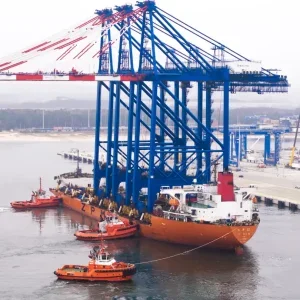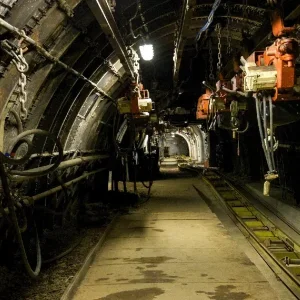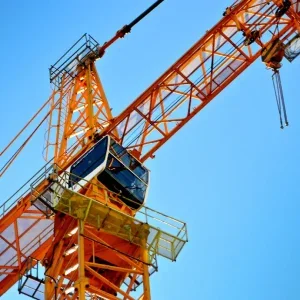The AH Al-Zamil Group of Companies is one of Saudi Arabia’s biggest industrial groups. It began as a trading house in the 1930s and in recent times has been one of the pioneering businesses that are turning Saudi Arabia from a country that buys and sells things into a country that actually manufactures. Today it claims to be the world’s largest exporter of pre-engineered steel buildings. It also produces power transmission towers and railway electrification structures, it manufactures air conditioning units, glass, window seals and other synthetic rubber products, nails and screws, ladders, plastics, marble and granite products, and industrial coatings. It also owns a travel agency, a general construction company and a food business. It is also the main shareholder in Saudi International Petrochemical Company. In other words, it is big. And it is also the majority owner – narrowly – of Eastern Morris Cranes (EMC), a 51/49 joint venture with Morris Material Handling Ltd of the UK. Morris, however, has operational control of the business.
HA Al-Zamil & Brothers Company, part of the AH Al-Zamil Group, has been selling crane kits supplied by UK-based Morris Material Handling Ltd for 10 years.
In 1997 Morris began working more closely with Al-Zamil, building cranes in Saudi effectively under subcontract to its own distributor, producing about 50 cranes a year.
Over time the two parties, Morris and Al-Zamil, grew more confident of each other and plans developed for a full joint venture relationship. The deal was driven by Brian Yates on the Morris side and by Abdul Aziz Al Hussaini, general manager of HA Al-Zamil & Brothers Company’s commercial division. Yates is now director and executive manager of EMC.
In September 2001 Morris and Al-Zamil secured a trading licence for Eastern Morris Cranes. On 10 February 2002 the company was formally launched when a new crane factory in Dammam in the Eastern Province was officially opened by the British ambassador to Saudi Arabia, Sir Derek Plumbly.
The new factory is owned by Al-Zamil and leased to Eastern Morris. It is about 50m by 65m and has two 20t and two 10t double girder cranes with 400 Series hoists, as well as machinery for plate cutting and a long seam welding jig. With this new factory, fabricating beams of 40m is not a problem. The cranes in the factory are equipped with infra-red remote control, an option that about half of Eastern Morris customers opt for in Saudi Arabia. Radio remote control requires a special licence and so its application is limited.
There had been a small factory before, but it could not cope with the production of cranes of more than 15m span and it was ill-equipped to cope with any kind of growth. There are also EMC branches in Jeddah and Riyadh. In fact Morris has had a presence in Saudi for many years. “We know there is a 1938 crane here,” says Brian Yates, “but it was 1952 that we took our first direct order from what is now Saudi Aramco.” Across Saudi Arabia there are about 500 Morris cranes at work, the company reckons, some built in the UK and others built from imported kits. Before the joint venture was established, says Morris chief executive Mike Maddock, Morris was limited to what it could do. Now the company is looking forward to growing the business with its brand new, purpose built crane factory.
“There are so many ways in which it is easier to do business in a joint venture rather than through agents,” says Yates. Perhaps the biggest benefit is that as a Saudi registered company Eastern Morris Cranes takes priority over foreign competitors on the tender lists of the major Saudi customers. These are Saudi Arabia Basic Industries Corporation (SABIC), Saudi Aramco, Saudi Consolidated Electric Company (SCECO) and the Ministry of Defence & Aviation (MODA). Should Saudi Arabia join the World Trade Organisation, however, the state companies will no longer be allowed to give this preferential treatment to Saudi companies. For now, though, government policy is the Saudi-isation of employment and supply.
A recently secured order has come from a paper mill in Dammam. Waraq Paper has ordered a crane with three hoists on a single pair of beams. In the middle is a 50t SWL hoist for moving heavy machinery for maintenance. At either side is a 25t hoist which together lift paper reels weighing up to 40t out of the machine. All three hoists are true vertical lift and are designed not to interfere with each other.
As well as building cranes, the company plans to grow its base of cranes under maintenance contracts. ‘One of the things we are really developing now,’ says Maddock, ‘is the service side of the business. That’s probably the biggest step.’
One of the first crane maintenance accounts to be secured is with nearby Zamil Steel PEB which produces pre-engineered buildings, turning out about 5,000t of structures a month. Zamil Steel PEB has 28 EOT cranes and 46 jib cranes in its six bay plant. Maintenance manager Peter Williams says he brought in Morris to maintain the overhead cranes because he did not have enough manpower and so his preventative maintenance programme was suffering. The jib cranes are still looked after in-house. “We’ve got a complete PM programme for every item of equipment in the entire factory,” Williams explains. “Every week the programme gives us an entire schedule of work. There are about six or seven types of overhead crane maintenance schedules each week.” One of Eastern Morris Cranes’ 27 employees is likely to be in Zamil Steel PEB’s factory every day.
The benefit of contracting out maintenance, says Williams, is not lower cost or improved performance, but simply that it releases his own manpower to do other things, since skilled mechanics are hard to find.
Eastern Morris Cranes also has a maintenance contract at United Gulf Steel’s rolling mill in Jubail Industrial City. It supplied nine cranes to this new facility just over a year ago (such were the limitations of the old factory, these cranes were built on site) and the maintenance contract was agreed when the warranty period came to an end. United Gulf Steel’s cranes range from 3t up to 30t SWL and have spans of 22m or 28m. Two 20t SWL cranes, two 15t SWL and a 10t SWL have rotating crabs that enable them to stack the rolled steel bars. Morris provides construction and maintenance manager PC Sahu with a report on each crane every three months. Sahu says that the maintenance schedule is based on a mix of British and DIN standards to suit his needs. DIN standards are used for ropes, slings and hooks because TUV, well represented in the vicinity, is brought in to certify them. British standards are used for everything else.
Sahu is full of praise for the service he gets from Morris – ‘They are one of the best I have ever seen,’ he says. ‘That’s the biggest plus point’ – but he voices concern about what he is sometimes asked to pay for spare parts. He also says that he would like to see Morris standardise its motors.
Al-Zamil, however, has no doubt that it has the best partner. ‘We chose Morris because they are leaders and our friends,’ says Hamed Al-Zamil, president of HA Al-Zamil & Brothers Company.






